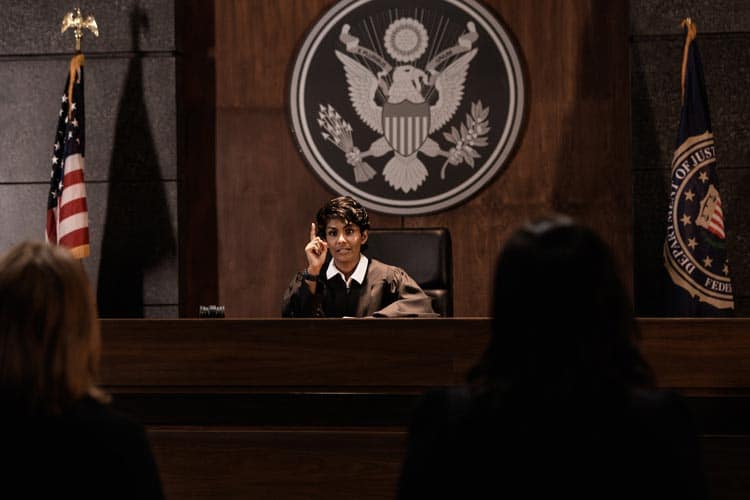
Different laws apply in federal court as compared to the state. To more fully understand federal crime, we must first understand federal criminal law vs. state criminal law.
US Courts
All of the courts in the US are federal, state, or local courts. Federal courts have jurisdiction over the constitutional matters or any federal laws passed by Congress. State courts, on the other hand, have jurisdiction over state and local laws.
State Jurisdiction
State court jurisdiction includes a broad range of criminal charges, from minor traffic violations to felonies. Most cases involving citizens are tried in state courts and not federal.
Federal Jurisdiction
The federal court jurisdiction includes things like bankruptcy, copyright, patent, antitrust, and more. Federal courts also come into play when the US government is sued or whenever the government is a party. Federal courts also try cases involving citizens from different states when an amount of money in dispute is more than 75 grand.
Federal Crimes vs State Crimes
Most crimes are considered state crimes, and therefore, tried in state courts. State crimes include a broad range of offenses, such as:
- Robbery
- Arson
- Murder
- Rape
- Theft and burglary
- And more
Federal crimes, however, are less broad since they involve a matter of national or federal interest, like counterfeiting or fraud.
It’s also important to remember that some state crimes are also federal crimes, such as bank robbery.
The federal criminal code covers many different offenses that are typically tried at the state level.
Federal crimes also include:
- Identity theft
- Drug trafficking
- Different types of fraud
State and federal laws also differ in how they are passed. State criminal laws are passed by the state government. Federal laws are passed by Congress or come from the constitution.
State and Federal Criminal Laws Require Different Attorneys
Federal courts include district courts, also known as trial courts, and circuit courts, which is the first level of appeal. These courts are located throughout the US.
When cases go to trial at the federal level, a US Attorney to Assistant US Attorney prosecutes them. When cases go to trial at the level, a state or district attorney will procedure them.
Whichever court defendants are charged in, they will need to seek legal help from an experienced criminal defense lawyer. Not all lawyers are the same, as some will only focus on state cases and others on federal, so it’s important to understand which you require. A lawyer with experience in both a state and federal court setting might be your best option if you are facing either charge.
Differences in Procedure
State and Federal prosecutions differ in many ways. Federal judges are appointed for life by the President of the United States. State court judges are appointed by the governor and must sit for re-election.
Prosecutions in State and Federal Court
It is possible to be prosecuted in both state and federal court, although it does not happen often. Federal and state courts can share jurisdiction over some cases.
The Fifth Amendment protects citizens from “Double Jeopardy,” which means that you cannot be put in jeopardy twice for the same offense. However, if you are tried and acquitted of a state charge, you may still be in jeopardy at the federal level. These are rare exceptions, but they do happen.
The double jeopardy clause only prevents multiple prosecutions by the same “sovereign,” or the same government. Federal and state governments are considered separate, so double jeopardy does not apply.
Federal courts may also hear cases that involve state laws when the state law is in violation of the US Constitution.
Consequences and Punishment
The punishments for both state and federal crimes vary. When it comes to federal sentencing, the majority of judges follow similar guidelines. Typically, federal penalties are longer than state penalties, even if the crimes are similar in nature. Those convicted of federal crimes and sentenced to go to prison will go to federal prison, not state prison.
Once you obtain the services of an experienced lawyer, they will walk you through the possible outcomes of your case. It’s important that you have an understanding of what you are facing in and out of court. Together, you and your attorney will craft the best defense so that you feel as confident as possible walking into court.
When to Get Legal Assistance
The timeframe for getting legal assistance is the same for both federal and state charges. Getting help from experienced lawyers is something that should be done as soon as possible. Once you know of the possibility of being charged with a state or federal crime, you should contact a defense lawyer immediately.
For federal charges, it’s crucial to find an attorney with experience representing defendants in federal court. The rules in federal court are different from those in the state, so you don’t want to take a lawyer experienced only in state court.
Also, whenever you are facing criminal charges, your attorney should have experience defending that particular type of case in the same court. Having knowledge not only of the charges but of the judge and the prosecution can give your defense a huge advantage.
Whether you are being tried in state or federal court, an attorney will help you navigate through the justice system to obtain the best outcome for your case. Make sure to do your homework to find a lawyer that you are comfortable with and confident in.
When discussing your case with a lawyer, make you have an understanding of their success with similar cases so that you can determine whether they are the right person to defend you. If they don’t have experience defending people in your situation, let them know, and they may be able to connect you with another lawyer at the same firm that’s better versed in that particular area of criminal law. Learn more about los angeles federal criminal attorney.
What else do you want to know about federal and state criminal law? Let us know in the comments.






